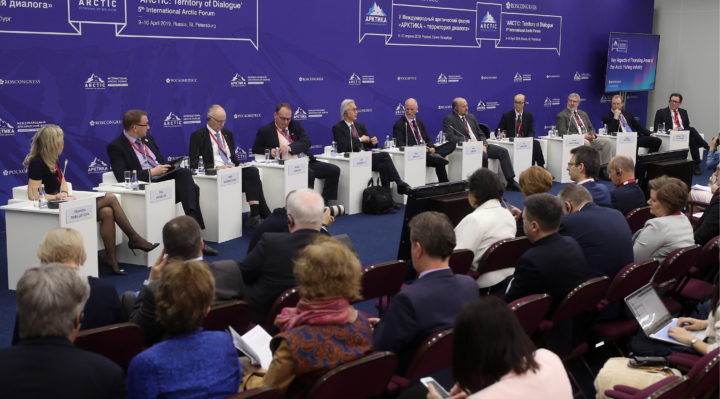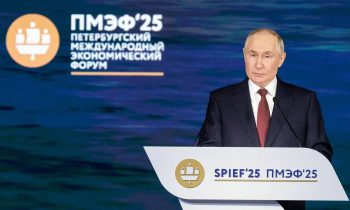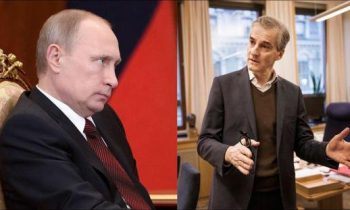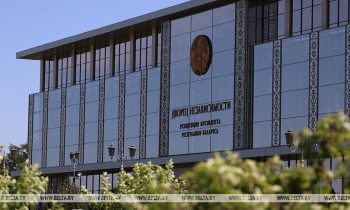The “Key Aspects of Promising Areas of the Arctic Fishing Industry” session was held as part of the ‘Arctic: Territory of Dialogue’ 5th International Arctic Forum. During the event, representatives of the government structures of the Arctic states, fisheries associations, scientific and other organizations discussed the most important aspects of international cooperation and the prospects for sustainable fisheries in the Arctic region.

Fisheries constitute a key sector of the Arctic economies, despite the inaccessibility of Arctic bioresources. At the same time, the Arctic remains a unique, primeval ecosystem on Earth, as difficult to study as Space.
Vasily Sokolov, Deputy Head of the Russian Federal Agency for Fishery, spoke about the Russian Federation’s goals and strategy in studying and using the Arctic region’s aquatic bioresources.
“The Arctic plays an important role in Russia’s fishing industry, the area of our northern seas being comparable or even exceeding that of a number of countries, so we are closely following the processes taking place there”, he reminded the audience. “In recent years, we have noted a marked increase in temperature and are closely watching the melting of the ice cover. Yet this presents not only potential challenges but also new opportunities for fishing”, Sokolov added.
According to Vasily Sokolov, migration of fish to the north is increasing and the catch has grown by an order of magnitude above latitude 70–75 degrees north. An interesting example is also the rapid growth of the population of invasive crabs in the Barents Sea – Kamchatka crab and snow crab (opilio crab). Today, their numbers suffice for commercial fisheries and bring financial profit to companies and the state.
Another popular trend developing in the Arctic region is aquaculture. “Norway is the leader in this area; we are following its success and also expect to increase aquaculture production in Russia”, Sokolov reported. “Even so, we must not forget the vulnerability of the northern ecosystems. Global experience shows that disregard for the basic rules and scientific recommendations can have unfortunate consequences.”
Essential to understanding the challenges and opportunities of sustainable use of Arctic resources is integrated research, which, together with the fight against IUU fishing, can be a key aspect of international cooperation.
“For a long time now, thanks to the work of the Joint Norwegian-Russian Fisheries Commission, the reserves in the Barents Sea have been preserved”, Sokolov gave the example. “In addition, last year’s efforts by ten nations resulted in agreement on preventing unregulated fishing in the central Arctic, in waters beyond national jurisdictions.”
Vasily Sokolov informed that an international conference on regulation of fishing in the Arctic will be held in Arkhangelsk on 12–13 April. Based on the results of this conference, a programme will be elaborated for joint scientific research. “We have not yet had cooperation of such a scale, with ten nations uniting to create an international programme for monitoring the Arctic. I hope that, during the conference, we will move forward in these matters”, Vasily Sokolov concluded.
The topic of international cooperation was continued by Kristjan Thor Juliusson, Minister of Fisheries and Agriculture of the Republic of Iceland. “Iceland and Russia have good relations in the field of fisheries; we are strengthening cooperation both in the supply of equipment for fishing, processing and exchange of experience in organizing sustainable fisheries”, he underlined.
For his part, Roy Angelvik, State Secretary for the Minister of Trade, Industry and Fisheries of the Kingdom of Norway, pointed to the importance of cooperation despite the competitive conditions. He said the joint Russian-Norwegian regulation of the common stocks in the Barents Sea should set an example of effective management of aquatic bioresources and such practices should be introduced in other fishing areas outside national waters.
Fisheries issues are a vital topic of the Arctic Forum: its participants discussed the opportunities and the risks to the economy of the World Ocean during a number of business programme events.
The topic of fishing in the Arctic, along with other global issues of world fisheries, will be considered at the Third Global Fishery Forum, which will be held in St Petersburg on 10–11 July. The organizer of the Global Fishery Forum and International exhibition for fishery, seafood and know-how is the Federal Agency for Fishery and the operator of the Forum is the Roscongress Foundation.
Official website of the Global Fishery Forum: www.fishexpoforum.com
Reference information:
Organizer: The Federal Agency for Fishery (Rosrybolovstvo) regulates the production, conservation, and reproduction of aquatic biological resources. The agency’s responsibilities include organizing industrial fishing, scientific support for fishing, developing aquaculture (commercial fish farming), supervising the safety of fishing vessel navigation and rescue operations in fishing areas as well as fish conservation measures.
One of the Agency’s top objectives is to ensure the sustainable development of the fishery industry, which makes a significant contribution to the country’s food security and is a driver of economic growth in the coastal regions.
The Russian Federation accounts for more than 5.5% of global fish production and ranks fourth in the world in terms of this indicator. In 2018, Russian fishermen had a record catch rate for the past 25 years: 5 million tonnes of aquatic biological resources were caught, or almost 5% more than in 2017.
With the information support of the Russian Ministry of Agriculture.
Forum operator: Roscongress Foundation is a socially oriented non-financial development institution and a major organizer of international conventions, exhibition, and public events.
The Roscongress Foundation was established in 2007 to help develop Russia’s economic potential, promote its national interests, and strengthen the country’s image. The Foundation thoroughly studies, analyses, compiles, and covers issues on the Russian and global economic agenda. The Foundation administers and facilitates the promotion of business projects and the raising of investments and also contributes to the development of social entrepreneurship and charitable projects.
Each year, the Foundation’s events bring together over 80,000 participants from 195 countries and are covered by more than 10,000 media representatives. The Foundation has some 2,500 experts involved in analytical and expert work in Russia and abroad and collaborates with foreign economic partners from 75 countries.
‘Arctic: Territory of Dialogue’ 5th International Arctic Forum
The ‘Arctic: Territory of Dialogue’ International Arctic Forum is one of the key platforms for the discussion, at a global level, of problems and prospects for the Arctic region. The Forum is an opportunity for members of the international community to pool their efforts to ensure the efficient development of the Arctic and higher living standards for populations living in Arctic territories. The ‘Arctic: Territory of Dialogue’ Forum was first held in 2010 and was devoted to contemporary problems of the Arctic region. The second forum was held in 2011 and focused on issues of developing transport systems in the Arctic. In 2013the key themes considered included environmental protection, while in 2017 the Forum’s theme was ‘People and the Arctic’. The key theme of the forthcoming 5th International Arctic Forum will be ‘The Arctic: An Ocean of Opportunity’. Three pillars will form the basis of the business programme: ‘Coastal Regions’, ‘The Open Ocean’, and ‘Sustainable Development’.



